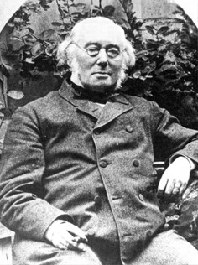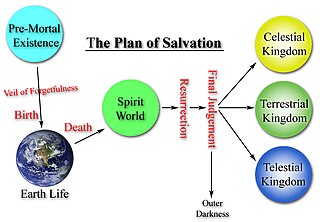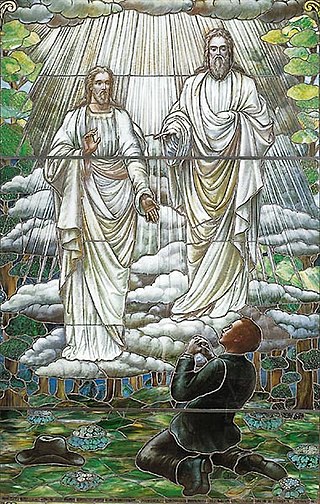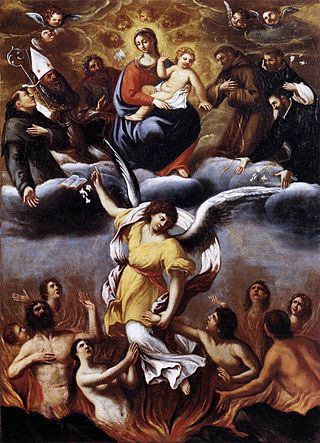Related Research Articles
Born again, or to experience the new birth, is a phrase, particularly in evangelicalism, that refers to a "spiritual rebirth", or a regeneration of the human spirit. In contrast to one's physical birth, being "born again" is distinctly and separately caused by baptism in the Holy Spirit, it is not caused by baptism in water. It is a core doctrine of the denominations of the Anabaptist, Moravian, Methodist, Quaker, Baptist, Plymouth Brethren and Pentecostal Churches along with all other evangelical Christian denominations. All of these Churches strongly believe Jesus's words in the Gospels: "You must be born again before you can see, or enter, the Kingdom of Heaven." Their doctrines also mandate that to be both "born again" and "saved", one must have a personal and intimate relationship with Jesus Christ.

Mormonism is the religious tradition and theology of the Latter Day Saint movement of Restorationist Christianity started by Joseph Smith in Western New York in the 1820s and 1830s. As a label, Mormonism has been applied to various aspects of the Latter Day Saint movement, although there has been a recent push from the Church of Jesus Christ of Latter-day Saints to distance themselves from this label. A historian, Sydney E. Ahlstrom, wrote in 1982, "One cannot even be sure, whether [Mormonism] is a sect, a mystery cult, a new religion, a church, a people, a nation, or an American subculture; indeed, at different times and places it is all of these." However, scholars and theologians within the Latter Day Saint movement, including Smith, have often used "Mormonism" to describe the unique teachings and doctrines of the movement.
Salvation is the state of being saved or protected from harm or a dire situation. In religion and theology, salvation generally refers to the deliverance of the soul from sin and its consequences. The academic study of salvation is called soteriology.

Albrecht Ritschl was a German Protestant theologian.

The Westminster Confession of Faith is a Reformed confession of faith. Drawn up by the 1646 Westminster Assembly as part of the Westminster Standards to be a confession of the Church of England, it became and remains the "subordinate standard" of doctrine in the Church of Scotland and has been influential within Presbyterian churches worldwide.
The Statement of Fundamental Truths is a confession of faith outlining the 16 essential doctrines adhered to by the Assemblies of God USA. These doctrines are heavily based on other evangelical confessions of faith but differ by being clearly Pentecostal. Of the 16 articles, four are considered core beliefs "due to the key role they play in reaching the lost and building the believer and the church". They are the doctrines concerning salvation, the baptism in the Holy Spirit, divine healing, and the Second Coming of Christ. The Statement of Fundamental Truths has undergone several permutations since its original adoption in 1916 despite common claims that it has remained largely unchanged.

The following outline is provided as an overview of and topical guide to Christian theology:
In orthodox Mormonism, the term God generally refers to the biblical God the Father, whom Latter Day Saints refer to as Elohim, and the term Godhead refers to a council of three distinct divine persons consisting of God the Father, Jesus Christ, and the Holy Ghost. However, in Latter Day Saint theology the term God may also refer to, in some contexts, the Godhead as a whole or to each member individually. Latter Day Saints believe that the Father, Son, and Holy Ghost are three distinct beings, and that the Father and Jesus have perfected, glorified, physical bodies, while the Holy Ghost is a spirit without a physical body. Latter Day Saints also believe that there are other gods and goddesses outside the Godhead, such as a Heavenly Mother—who is the wife of God the Father—and that faithful Latter-day Saints may attain godhood in the afterlife. The term Heavenly Parents is used to refer collectively to the divine partnership of Heavenly Father and a Heavenly Mother. Joseph Smith taught that God was once a man on another planet before being exalted to Godhood.
Agency, in the theology of the Church of Jesus Christ of Latter-day Saints, is "the privilege of choice which was introduced by God the Eternal Father to all of his spirit children in the premortal state". Mortal life is viewed as a test of faith, where our choices are central to the plan of salvation in Latter-day Saint teaching. "It was essential for their eternal progression that they be subjected to the influences of both good and evil". LDS Church members believe that Lucifer rebelled against the God's plan, which resulted in a war in heaven, and Lucifer being cast out of heaven and becoming Satan.

According to the doctrine of the Church of Jesus Christ of Latter-day Saints, the largest denomination in the Latter Day Saint movement, the plan of salvation is a plan God created to save, redeem, and exalt humankind, through the atonement of Jesus Christ. The elements of this plan are drawn from various sources, including the Bible, Book of Mormon, Doctrine & Covenants, Pearl of Great Price, and numerous statements made by the leadership of the Church of Jesus Christ of Latter-day Saints. The first appearance of the graphical representation of the plan of salvation was provided in the 1952 missionary manual entitled A Systematic Program for Teaching the Gospel.
The Church of Jesus Christ of Latter-day Saints teaches that Adam and Eve were the first man and the first woman to live on the earth and that their fall was an essential step in the plan of salvation. Adam in particular is a central figure in Mormon cosmology. Robert L. Millet, a Latter-day Saint author, wrote of the church's perspective:
Few persons in all eternity have been more directly involved in the plan of salvation—the creation, the fall, and the ultimate redemption of the children of God—than the man Adam. His ministry among the sons and daughters of earth stretches from the distant past of premortality to the distant future of resurrection, judgment, and beyond.

In Christian theology, Hell is the place or state into which, by God's definitive judgment, unrepentant sinners pass in the general judgment, or, as some Christians believe, immediately after death. Its character is inferred from teaching in the biblical texts, some of which, interpreted literally, have given rise to the popular idea of Hell. Theologians today generally see Hell as the logical consequence of rejecting union with God and with God's justice and mercy.
Eastern Orthodox theology is the theology particular to the Eastern Orthodox Church. It is characterized by monotheistic Trinitarianism, belief in the Incarnation of the essentially divine Logos or only-begotten Son of God, a balancing of cataphatic theology with apophatic theology, a hermeneutic defined by a Sacred Tradition, a catholic ecclesiology, a robust of the person, and a principally recapitulative and therapeutic soteriology.

Mormon cosmology is the description of the history, evolution, and destiny of the physical and metaphysical universe according to Mormonism, which includes the doctrines taught by leaders and theologians of the Church of Jesus Christ of Latter-day Saints, Mormon fundamentalism, the Restoration Church of Jesus Christ, and other Brighamite denominations within the Latter Day Saint movement. Mormon cosmology draws from Biblical cosmology, but has many unique elements provided by movement founder Joseph Smith. These views are not generally shared by adherents of other Latter Day Saint movement denominations who do not self-identify as "Mormons", such as the Community of Christ.

The Church of Jesus Christ of Latter-day Saints focuses its doctrine and teaching on Jesus Christ; that he was the Son of God, born of Mary, lived a perfect life, performed miracles, bled from every pore in the Garden of Gethsemane, died on the cross, rose on the third day, appeared again to his disciples, and now resides, authoritatively, on the right hand side of God. In brief, some beliefs are in common with Catholics, Orthodox and Protestant traditions. However, teachings of the LDS Church differ significantly in other ways and encompass a broad set of doctrines, so that the above-mentioned denominations usually place the LDS Church outside the bounds of orthodox Christian teaching as summarized in the Nicene Creed.

In Christianity, sin is an immoral act considered to be a transgression of divine law. The doctrine of sin is central to the Christian faith, since its basic message is about redemption in Christ.

Mormonism and Nicene Christianity have a complex theological, historical, and sociological relationship. Mormons express their doctrines using biblical terminology. They have similar views about the nature of Jesus Christ's atonement, bodily resurrection, and Second Coming as mainstream Christians. Nevertheless, most Mormons do not accept the doctrine of the Trinity as codified in the Nicene Creed of 325 and the Nicene-Constantinopolitan Creed of 381. Although Mormons consider the Protestant Bible to be holy scripture, they do not believe in biblical inerrancy. They have also adopted additional scriptures that they believe to have been divinely revealed to Joseph Smith, including the Book of Mormon, the Doctrine and Covenants, and the Pearl of Great Price. Mormons practice baptism and celebrate the sacrament of the Lord's Supper, but they also participate in other religious rituals. Mormons self-identify as Christians.
Islam and Mormonism have been compared to one another ever since the earliest origins of the latter in the nineteenth century, often by detractors of one religion or the other—or both. For instance, Joseph Smith, founder of the Latter Day Saint movement, was referred to as "the modern Muhammad" by the New York Herald, shortly after his murder in June 1844. This epithet repeated a comparison that had been made from Smith's earliest career, one that was not intended at the time to be complimentary. Comparison of the Mormon and Muslim prophets still occurs today, sometimes for derogatory or polemical reasons but also for more scholarly and neutral purposes. Although Mormonism and Islam certainly have many similarities, there are also significant, fundamental differences between the two religions. Mormon–Muslim relations have historically been cordial; recent years have seen increasing dialogue between adherents of the two faiths, and cooperation in charitable endeavors. In terms of a mainstream Islamic as well as Christian perspective, Mormons are sometimes compared to Ahmadiyya in that they are sometimes not accepted as belonging within mainstream Christianity and Islam, respectively.

Purgatory is, according to the belief of some Christian denominations, an intermediate state after physical death for expiatory purification. The process of purgatory is the final purification of the elect, which is entirely different from the punishment of the damned. Tradition, by reference to certain texts of scripture, sees the process as involving a cleansing fire. Some forms of Western Christianity, particularly within Protestantism, deny its existence. Other strands of Western Christianity see purgatory as a place, perhaps filled with fire. Some concepts of Gehenna in Judaism resemble those of purgatory.

Christian theology is the theology of Christian belief and practice. Such study concentrates primarily upon the texts of the Old Testament and of the New Testament, as well as on Christian tradition. Christian theologians use biblical exegesis, rational analysis and argument. Theologians may undertake the study of Christian theology for a variety of reasons, such as in order to:
References
- ↑ Wayne Grudem, Systematic Theology: An Introduction to Biblical Doctrine (Zondervan, 1994): 810.
- ↑ Guy P. Duffield and Nathaniel M. Van Cleave, Foundations of Pentecostal Theology, 1983, (Los Angeles: Foursquare Media, 2008), p. 524.
- ↑ "Spiritual Death - Mormonism, the Mormon Church, Beliefs, & Religion - MormonWiki".
- ↑ Alma 42:7
- ↑ "The Fall of Man and His Redemption", Ensign , January 1990, p. 22.
- ↑ True to the Faith, "Death, Spiritual."
- ↑ David Paulsen, “Joseph Smith and the Problem of Evil."